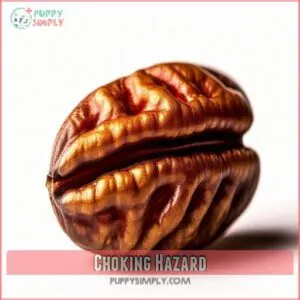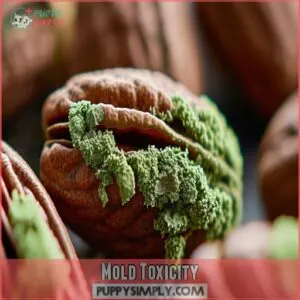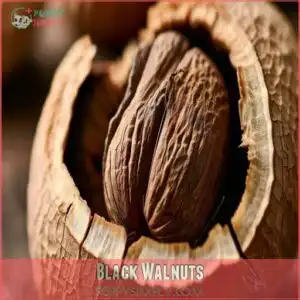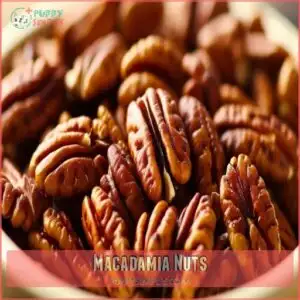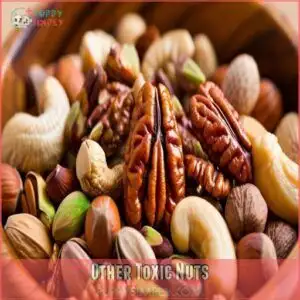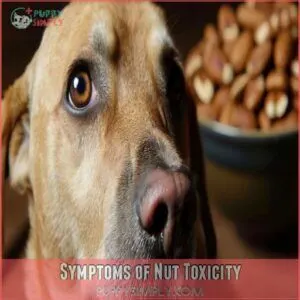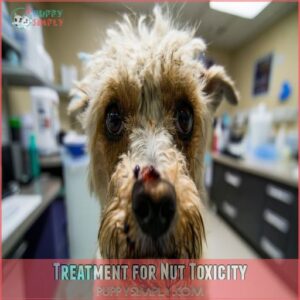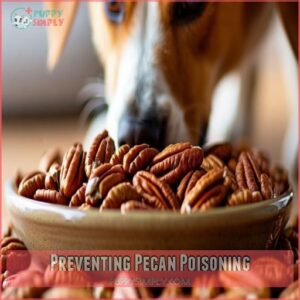This site is supported by our readers. We may earn a commission, at no cost to you, if you purchase through links.
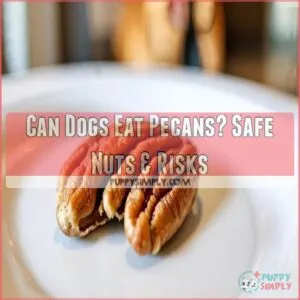 Can dogs eat nuts like pecans?
Can dogs eat nuts like pecans?
Surprisingly, giving Fido a pecan treat might not be as harmless as sharing your popcorn at movie night.
Pecans contain a compound called juglone, which is bad news for pups, potentially causing tremors or even seizures.
These nuts are also a choking hazard and pack a punch of fat that can upset Rover’s tummy, leading to pancreatitis.
It’s best to keep pecans out of paw’s reach and opt for safer, dog-approved treats.
Thinking about other snacks?
While some nuts can be toxic to dogs, knowing what Huskies can and can’t eat safely is crucial, especially when it comes to common allergens like dairy and soy as outlined in the ultimate guide to what huskies can and cant eat. Stick around to uncover which nuts are safe or risky for your furry friend’s health.
Table Of Contents
- Key Takeaways
- Pecan Risks for Dogs
- Can Dogs Eat Pecans or Nuts
- Nuts Toxic to Dogs
- Preventing Pecan Poisoning
- What to Do if Your Dog Eats Pecans
- Frequently Asked Questions (FAQs)
- Can dogs eat pecans?
- Are pecans healthy snack?
- Can dogs eat pecans & walnuts?
- Can dogs eat nuts?
- Can pecans cause pancreatitis in dogs?
- Are nuts bad for pets?
- What happens if my dog eats a pecan?
- Which nuts are toxic to dogs?
- How to stop a dog from eating pecans in the yard?
- Is it safe to eat ground pecan shells in dog food?
- Are small amounts of nuts ever safe for dogs?
- How do pecans affect a dogs diet?
- Can certain dog breeds eat pecans safely?
- What are signs of nut allergies in dogs?
- Are nut-based oils harmful to dogs?
- Conclusion
Key Takeaways
- Keep pecans away from your dog since they can cause choking, mycotoxin-related sickness, and pancreatitis.
- Avoid feeding any nuts to your dog as some, like macadamia nuts and black walnuts, are toxic and pose serious health risks. Similarly, human foods like pepperoni can be toxic to dogs due to its high fat content and presence of garlic and onion, as explained in the guide to pepperoni dangers for dogs.
- Opt for dog-friendly snacks such as carrots, cucumbers, or apple slices without seeds as safer alternatives.
- Always supervise your dog around potential hazards and consider pet-proof storage solutions to prevent nut-related accidents.
Pecan Risks for Dogs
Feeding pecans to your dog might seem like a harmless treat, but it can actually pose several health risks.
These nuts can lead to choking hazards, mold toxicity, and even pancreatitis, making them a less-than-ideal snack for your furry friend.
Choking Hazard
Have you ever watched a small dog try to tackle a football-sized snack?
Pecans are like that—perfect bite-size for us, but potential trouble for our furry friends.
Their size can be a choking hazard, especially for small dog breeds.
Pet safety tips: supervise munching, offer smaller treats, and know some choking first aid.
Mold Toxicity
Mold growth on pecans can release mycotoxins, nasty foes for your dog’s health.
These toxins might cause tremors or seizures.
To keep wagging tails safe:
- Storage Tips: Always store pecans in dry, airtight containers.
- Pecan Safety: Check regularly for mold on all nuts.
- Avoid Spoilage: Discard any nuts showing signs of deterioration.
- Dog Health: Regular vet checks help spot early signs of exposure.
Intestinal Blockage
Pecans aren’t just risky due to mold; they can also cause intestinal blockages.
Their shells and size pose a swallowing challenge, likening them to a tricky puzzle your dog’s digestive system can’t solve.
If your dog does ingest a pecan, it’s a good idea to be prepared by knowing the best course of action for a dog pecan blockage emergency.
Symptoms like vomiting or digestive discomfort may follow.
Prevention is key—keep these nuts out of reach to avoid emergency vet visits and treatment woes.
High in Fat and Calories
Think again before handing over those pecans to Fido. They’re packed with fats and calories, kicking weight gain and even obesity into high gear if you’re not careful. Chew on these points:
- Weight Gain: Extra pounds can sneak up.
- Calorie Counting: Those nuts add up quick.
- Dietary Needs: Stick to dog-friendly snacks.
- Obesity Risks: Serious health concerns follow.
Risk of Pancreatitis
Your dog’s belly might turn topsy-turvy on a high-fat diet like fatty foods, including pecans.
Pancreatitis symptoms, such as vomiting and belly pain, are no laughing matter and can crop up unexpectedly.
A swift dietary change is essential to protect your pooch’s pancreas.
| Symptoms | Risks |
|---|---|
| Vomiting | Pancreatitis |
| Abdominal Pain | Intestinal Issues |
| Lethargy | Weight Gain |
Can Dogs Eat Pecans or Nuts
So, you’re wondering if your furry friend can safely munch on pecans or other nuts?
Let’s explore which nuts are safe for dogs and which ones you should keep far away from those adorable paws.
Toxic Nuts for Dogs
Dogs shouldn’t munch on black walnuts or macadamia nuts—these are toxic to them.
You might see nut toxicity symptoms like vomiting, tremors, or lethargy.
While pecans aren’t poisonous, they still pose certain risks for dog health.
Imagine finding a stash of macadamias causing chaos in your pup’s tummy!
Always steer clear of these and opt for safer choices.
Watch out for nut poisoning treatment and make sure your furry friend stays safe.
Safe Alternatives to Nuts
Looking for dog-friendly snacks? Skip the nuts and try some healthy treats like carrots, cucumbers, or green beans.
These are safe alternatives, offering nutritious options without the risk.
You can also find a variety of best dog treats online, like those found at healthy dog treats online.
Even apple slices (minus the seeds) or a bite of banana make good substitutes.
Dogs love variety, so why not mix a little surprise into their diet?
They’ll wag tails with joy!
Nuts and Pancreatitis
Switching to a nut-free diet might just save your pup some tummy troubles.
Nuts, especially the high-fat kind, can trigger pancreatitis in dogs, leading to symptoms like vomiting and belly pain.
It’s like giving a matchstick to a pyromaniac—a disaster waiting to happen.
Choose safer dog food options to keep your furry friend healthy and happy.
High Calorie Content of Nuts
In controlling your dog’s weight, it’s smart to skip nut snacks.
Nuts pack high calories, often leading to weight gain and obesity risks for your furry companion.
Use these tips for calorie control:
- Choose low-calorie dog treats over nuts.
- Limit high-fat foods to avoid unnecessary pounds.
- Monitor portion sizes to maintain a healthy weight.
Nuts Toxic to Dogs
You might love snacking on nuts, but certain ones like black walnuts and macadamia nuts are toxic to dogs and can cause serious symptoms.
It’s important to know which nuts are harmful to your furry friend to avoid accidental snacking mishaps.
Black Walnuts
Black walnuts spell trouble for your furry friend.
These nuts can cause walnut poisoning, with symptoms like vomiting and muscle tremors.
Picture having coffee spilled on your shirt—it’s unwanted, messy, and hard to shake off.
Macadamia nuts are toxic to dogs and can cause tremors, weakness, and paralysis, check safe nuts for dogs. Keep your dog safe by avoiding black walnut toxicity.
Here’s a quick glance:
| Danger | Symptoms |
|---|---|
| Vomiting | Muscle Tremors |
| Seizures | High Temperature |
Macadamia Nuts
Among the nuts posing a serious threat to your canine companion are macadamia nuts.
These seemingly innocent treats can cause macadamia nut toxicity, leading to a range of unpleasant symptoms.
Think vomiting, tremors, and weakness—not a fun time for your furry friend.
Prevention is key; keep macadamia nuts well out of reach.
Fortunately, plenty of safe nut alternatives exist, offering delicious and healthy snacks for your dog.
Remember, always prioritize their safety!
Other Toxic Nuts
Several nuts lurk as hidden dangers to your dog’s health, including seemingly innocuous foods like pastries with poppy seeds toxicity risks, beyond what might first come to mind.
Cashews and pistachios might seem harmless but can cause upset stomachs or worse.
Hazelnuts pose a choking hazard, while hickory nuts and walnuts are unsafe due to toxicity concerns, causing walnut dangers.
Choose safe snacks like specially formulated dog treats instead.
Symptoms of Nut Toxicity
Nut toxicity in dogs often shows up with a nasty mix of vomiting and diarrhea, leaving your furry friend looking utterly miserable.
Expect lethargy, like they’ve lost their mojo, and watch out for those alarming tremors.
Seizures might rear their ugly head too.
Keep an eye on these symptoms; they’re your red flags that something’s amiss in your pet’s world.
Treatment for Nut Toxicity
If your dog gobbles down toxic nuts, swift action is key.
Start with these four steps to seek veterinary care promptly:
- Identify the nut and symptoms.
- Contact your vet immediately.
- Avoid home remedies unless advised.
- Prepare for possible emergency treatment.
Stay calm, follow expert advice, and you’ll help protect your furry friend from long-term effects.
Preventing Pecan Poisoning
To keep Fluffy safe from pecan poisoning, store pecans out of reach and use pet-proof containers to block access.
Just like you wouldn’t let your dog drive a car, don’t leave them alone with treats they can’t handle.
Storage and Handling
To keep your pup safe from pecan mishaps, store these nuts out of their reach.
Opt for airtight containers to prevent curious snouts from finding a treat.
Handling pecans with care reduces cross-contamination accidents, especially during spills.
After all, a little precaution goes a long way in ensuring pecan disposal doesn’t turn your kitchen into a canine emergency room visit.
Pet-Proof Containers
Keeping your curious pooch out of the pecan stash starts with smart pet-proof storage.
Imagine those nuts, like treasure, locked away in airtight containers.
This prevents accidental snacking and keeps food fresh and away from furry noses.
Make your kitchen a fortress where only dog-safe food reigns.
It’s about kitchen safety and peace of mind.
Supervision During Consumption
Storing pecans in pet-proof containers is a great first step, but don’t stop there! Active supervision is key. Remember, curious pups are always sniffing around.
- Keep pecan snacks out of sight.
- Don’t leave Holiday treats unattended.
- Be mindful of dropped food.
- Supervise your dog around guests who might offer Human food.
- Teach your dog a solid "leave it" command.
Pet Insurance and Veterinary Care
When your furry friend gets into pecan mischief, having pet insurance can be a lifesaver for those unexpected vet visit costs.
Think of it as a safety net, cushioning the blow of emergency vet care and expensive treatments.
It covers preventative care too, making sure you and your dog are prepared for life’s little surprises.
Many veterinarians rely on disability insurance protection to protect their income in case of unexpected events.
Monitoring for Signs of Allergy
Recognizing allergies can be as tricky as spotting a chameleon in a garden.
Watch for these tell-tale allergy symptoms in your dog: If you suspect your dog has allergies, understanding atopy signs and testing can help identify the cause
- Itchy skin or hives
- Swollen face or paws
- Persistent sneezing or coughing
- Digestive troubles, like vomiting.
If you suspect your dog has a pecan allergy, consider taking a Pecan Allergy Test.
Since dog breeds differ, check anaphylaxis risks and explore treatment options.
Stay sharp to keep your furry friend safe.
What to Do if Your Dog Eats Pecans
If your dog decides to snack on pecans, act quickly and contact your vet to get expert advice.
Don’t try any home remedies without professional guidance, or Fido might get himself in a real pickle!
Keep an eye out for symptoms like vomiting and diarrhea.
Immediate Veterinary Care
If your dog devours pecans, you’ve got a veterinary emergency on your hands.
Urgent care is essential to tackle pet poisoning.
Toss out any hesitation and visit an emergency vet right away.
They’ll evaluate dog health, provide necessary treatment, and set your pet on a path to recovery.
| Symptom | Potential Cause | Action Required |
|---|---|---|
| Vomiting | Pecan ingestion | Vet consultation |
| Lethargy | Poisoning risk | Urgent care needed |
| Abdominal pain | Blockage | Immediate attention |
| Tremors | Toxin exposure | Emergency vet visit |
Symptoms of Pecan Poisoning
You’ve rushed to the vet, and now you’re left watching for signs.
Pecans aren’t just pesky; they can pack a nasty punch to dogs.
Keep an eye out for these symptoms:
- Vomiting: Your pup might start throwing up suddenly.
- Diarrhea: Loose stools are a key warning.
- Lethargy: Lacking energy could signal trouble.
- Abdominal pain: Watch if they seem uncomfortable or in pain.
Inducing Vomiting
Spotting pecan poisoning symptoms can be worrying, but knowing when to induce vomiting is key.
It’s not a DIY moment—always seek vet guidance first.
Risks involved in inducing vomiting without professional advice can outshine home remedies.
If your dog’s in distress, alternatives like immediate vet care are smarter.
Let’s keep their tails wagging safely!
Potential Long-Term Health Effects
While most pups bounce back from a pecan mishap, serious cases can lead to liver damage or kidney damage.
Digestive issues are common, and you might even see weight gain or behavioral changes.
Don’t panic, but keep a close eye on your furry friend and seek veterinary help if symptoms persist. Early intervention is key to preventing long-term problems.
Prevention and Precautionary Measures
To keep Fido safe, practice pecan storage like a pro.
Stash those nuts high and in pet-proof containers, leaving no room for holiday hazards.
Choose dog-safe snacks and nut-free treats instead.
Always supervise feeding to avoid accidents, and remember—an ounce of prevention is better than a pound of vet bills.
Keep your furry friend healthy and happy!
Frequently Asked Questions (FAQs)
Can dogs eat pecans?
Did you know that pecans can lead to severe health issues in dogs?
These nuts pose risks like choking, mycotoxin-induced sickness, and pancreatitis.
It’s best to avoid giving pecans to your dog entirely for their safety.
Are pecans healthy snack?
Pecans are nutritious for humans, offering healthy fats, fiber, and vitamins.
They’re great for heart health and digestion, but watch your portions—they’re high in calories.
Enjoy them as a tasty, mindful treat, but don’t overindulge!
Can dogs eat pecans & walnuts?
Sure, pecans and walnuts add crunch to your snack, but they’re a risky chew for dogs.
Pecans can cause blockages or pancreatitis,
while walnuts might lead to tummy trouble or seizures.
Stick to dog-friendly treats instead.
Can dogs eat nuts?
No, many nuts are risky for dogs.
Some are toxic; others cause upset stomachs or choking.
Stick to dog-safe treats like carrots and blueberries.
Always check with your vet if you’re unsure.
Can pecans cause pancreatitis in dogs?
Yes, pecans pose a risk of pancreatitis in dogs due to their high fat content.
Pancreatitis symptoms include vomiting, diarrhea, and abdominal pain.
It’s best to keep pecans out of your dog’s diet to safeguard health.
Are nuts bad for pets?
Feeding nuts to pets seems like a nutty idea, right?
Many nuts pose choking hazards, cause tummy troubles, or contain toxic substances.
Stick to pet-safe treats and keep those trail mixes out of paw’s reach!
What happens if my dog eats a pecan?
If your dog eats a pecan, it might face choking, gastrointestinal upset, or pancreatitis.
Pecans can contain mycotoxins, leading to tremors or seizures.
Monitor for symptoms and contact your vet if any concerns arise.
Which nuts are toxic to dogs?
Watch out—macadamia nuts and black walnuts can be toxic to your dog.
They cause symptoms like vomiting, tremors, and muscle weakness.
Always keep these nuts safely stored away from your furry friend’s curious nose.
How to stop a dog from eating pecans in the yard?
Fence off pecan trees to keep your dog away, or clean fallen pecans daily.
Supervise outdoor play and train your dog with commands like "leave it."
Consider a deterrent spray on pecans to discourage curiosity.
Is it safe to eat ground pecan shells in dog food?
No, ground pecan shells aren’t safe for your dog. They’re a choking hazard and can cause intestinal blockages. Stick to dog-friendly treats!
Are small amounts of nuts ever safe for dogs?
Think of nuts as a potential minefield for dogs.
While a few types are okay in tiny amounts, like plain, unsalted peanuts, most pose risks.
Stick to dog-safe treats to guarantee peace of mind.
How do pecans affect a dogs diet?
Pecans aren’t ideal for dogs.
They’re high in fat, risking pancreatitis.
They can be choking hazards or moldy, leading to toxicity.
Keep them out of reach to maintain your dog’s health and sidestep veterinary emergencies.
Can certain dog breeds eat pecans safely?
Regardless of breed, it’s best to exercise caution when introducing pecans into your dog’s diet.
Some canines may be more sensitive to the potential risks, such as pancreatitis or intestinal blockages.
What are signs of nut allergies in dogs?
If your dog is allergic to nuts, you might notice signs like itching, swelling, hives, excessive licking, or even vomiting.
In severe cases, difficulty breathing may occur, so always watch for unusual reactions after new treats.
Are nut-based oils harmful to dogs?
Despite their silky charm, nut-based oils can trip dogs’ tummies into turmoil.
While small amounts are generally safe, these oils can cause digestive upset or weight gain.
Always check for harmful additives like xylitol before sharing.
Conclusion
Ultimately, remember this: can dogs eat pecans? The short answer is no.
While some nuts are okay in moderation, pecans pose several risks. Their high fat content can trigger pancreatitis, and juglone can cause serious health issues.
Always prioritize your dog’s safety. When sharing treats with your furry friend, be aware that some ingredients like poppy seed toxicity risks can cause harm. Choose dog-friendly treats instead of risking potential harm from can dogs eat pecans or other potentially toxic nuts. A little precaution goes a long way in ensuring your furry friend enjoys a long and healthy life. Keep pecans out of reach and opt for safer alternatives.

